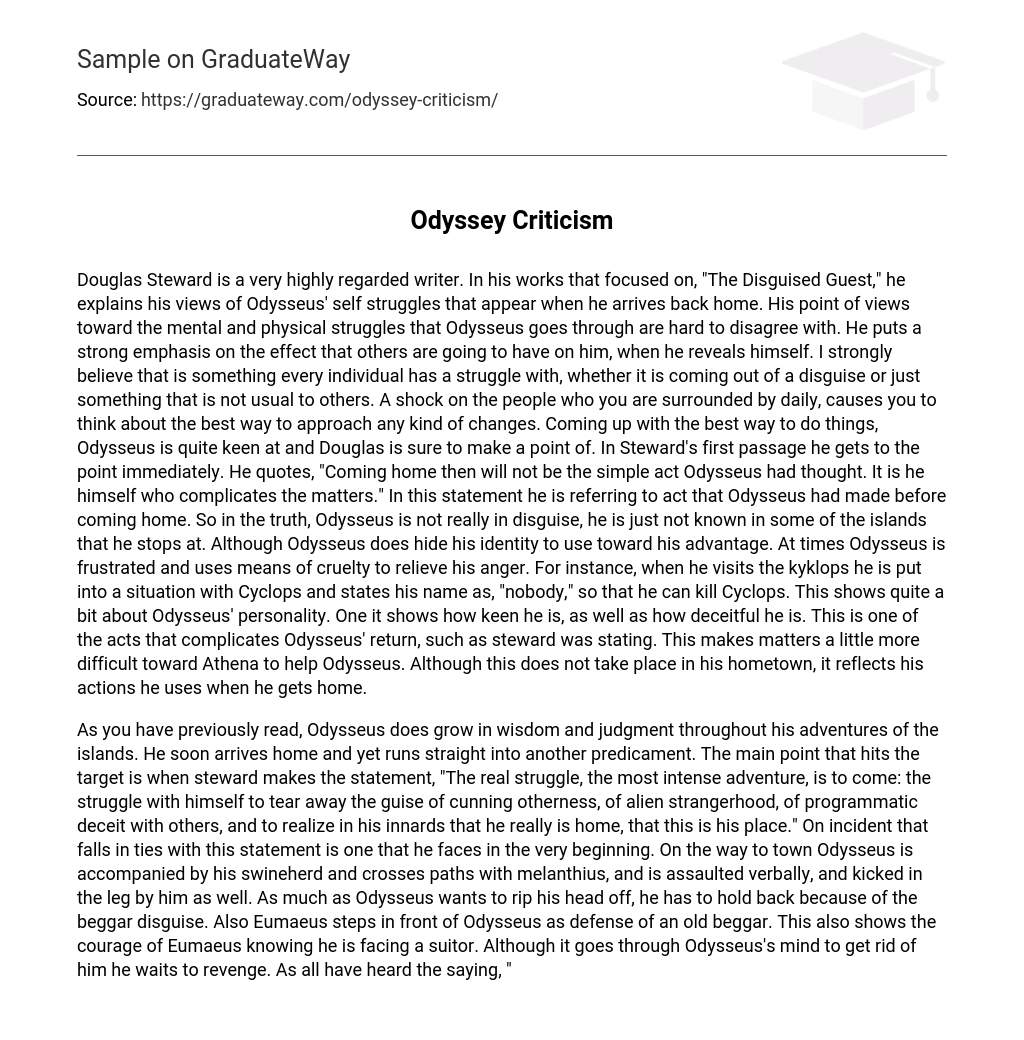In his story “The Disguised Guest,” Douglas Steward delves into the inner struggles faced by Odysseus as he journeys back home. Steward’s perspective on the mental and physical challenges encountered by Odysseus is widely acknowledged. He emphasizes the impact that others will have on Odysseus when he finally reveals his true identity, a relatable experience for every individual. The potential shock that familiar surroundings may undergo prompts individuals to consider the most appropriate approach to any changes. Steward highlights Odysseus’s remarkable ability to strategize and adapt. In his initial passage, Steward promptly addresses the point, quoting, “Coming home then will not be the simple act Odysseus had thought.It is he himself who complicates matters.” This statement alludes to Odysseus’s actions prior to returning home, where although not truly disguised, he remains unknown to some of the islands he visits.However, there are times when Odysseus conceals his true identity for personal gain. He occasionally becomes frustrated and resorts to cruel methods to release his anger. One example is during his encounter with the Cyclops, where he deceives and kills him by introducing himself as “nobody.” This text highlights various aspects of Odysseus’ personality, such as sharpness and cunning, which contribute to the challenges he faces while trying to return home, as mentioned by Steward. Additionally, these actions hinder Athena’s ability to assist Odysseus. Although these events don’t occur in his hometown, they still reflect his behavior upon his arrival.
As mentioned previously, Odysseus demonstrates an increase in wisdom and judgment as he journeys through various islands. However, upon his return home, he encounters yet another problem. The steward emphasizes this point by stating, “The true struggle, the most intense adventure, is still to come: the battle within himself to shed the disguise of deceit and realize that he is truly home.” An incident that aligns with this statement occurs in the beginning. While on his way to town, Odysseus is accompanied by his swineherd and has an encounter with Melanthius. He is verbally attacked and even kicked in the leg. Despite his desire to retaliate, Odysseus restrains himself due to his beggar disguise. Additionally, Eumaeus steps in front of Odysseus to defend him against the suitor. This showcases Eumaeus’s bravery. Although Odysseus contemplates getting rid of him, he chooses to wait for revenge. Moreover, Odysseus faces a dilemma regarding his old dog, Argos. He sees Argos sitting in a neglected state with mange and filth, conveying sorrowful eyes and a submissive posture.Despite the pain it causes Odysseus, he averts his gaze as a tear trickles down his cheek. This truly demonstrates Odysseus’ remarkable ability to restrain himself. It serves as a compelling example of the concept of “the struggle with himself” noted by Steward. Personally, if he can resist such emotions, he captivates me as a covert hero. Another instance showcasing his admirable demeanor arises when he is in the castle amidst the suitors and Penelope’s feast. While the suitors indulge in food provided by Odysseus’ livestock, he takes a circuitous path around the table, asking for leftovers. One of the suitors, named Antinous, recalls their encounter on the road and becomes offended and angry, complaining to Eumaeus about bringing Odysseus here to disrupt his serene and delightful meal. As Eumaeus retaliates in their exchange, risking his own life, Telemachus intercedes and redirects the argument towards himself. Despite being centrally positioned within the unfolding drama, Odysseus remains powerless to intervene. Though he covertly asks Antinous for a piece of crust, he joins in by proclaiming, “You resemble a King to me,” further provoking Antinous. Growing furious, Antinous hurls a footstool at Odysseus, striking him directly in the back. This incident perfectly aligns with the notion of “programmatic deceit with others.”Considering the numerous previous examples that have been criticized, one would assume that Odysseus does not feel like he is truly at home. Having been away for twenty years, it is expected that some changes would occur, but not to the extent that Odysseus encounters on his first day back. This drastic transformation comes as a major shock to Odysseus and prompts him to start thinking differently. How can one believe this is their hometown when it has changed so much during their long absence? This situation throws Odysseus off track, although not entirely. Feeling a little out of place, he reflects on his plan to reveal himself. Recognizing that he will have a perfect opportunity to do so at the upcoming games, he patiently awaits the next day.
As the day arrives, Odysseus prepares. Despite the attempts of some suitors to win Penelope’s love, they all fail. Disguised as a beggar, Odysseus witnesses their failures one by one and realizes it’s his opportunity. He takes on the challenge and effortlessly completes it, killing all the suitors while revealing his true identity. In addition to that, he also succeeds in winning Penelope’s heart.
We can see Odysseus as a highly successful ruler who encounters a wide range of experiences. Throughout the story, Odysseus consistently demonstrates his sympathetic nature, proving to readers his complexity and ability to cope with various challenges. The text has 1,119 words and spans 24 pages.





